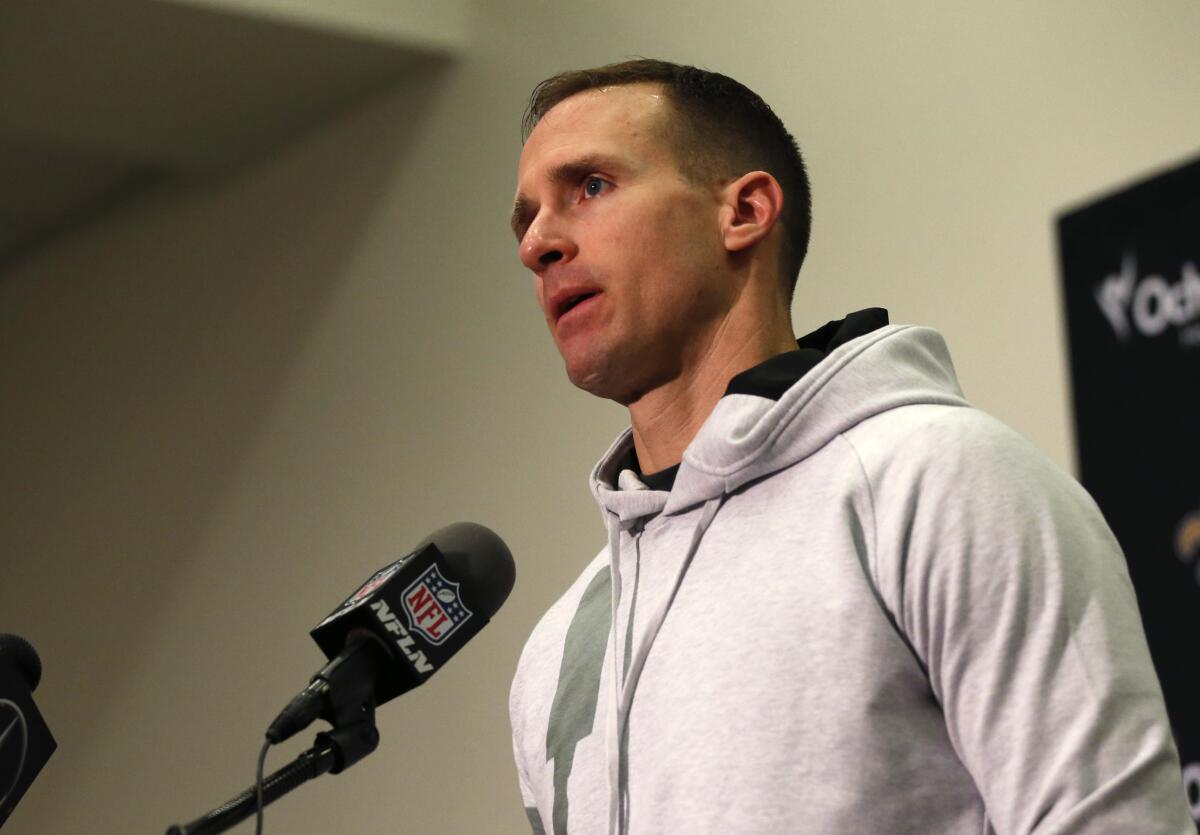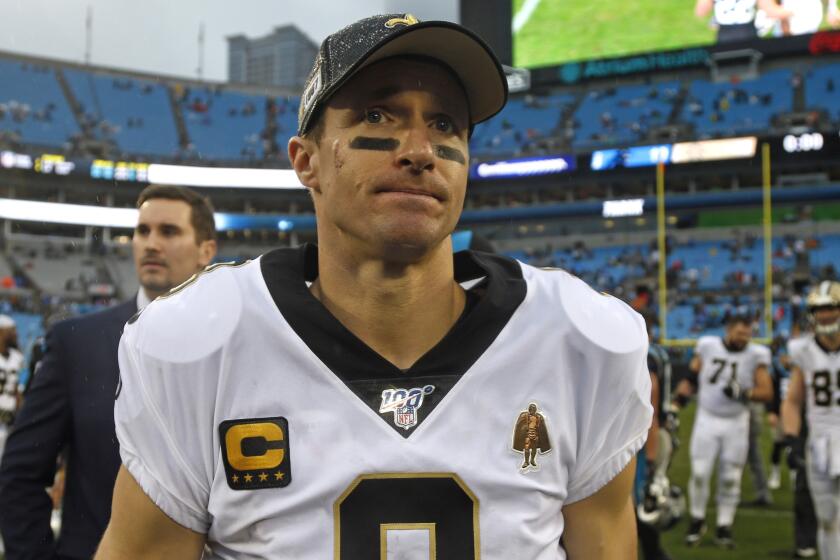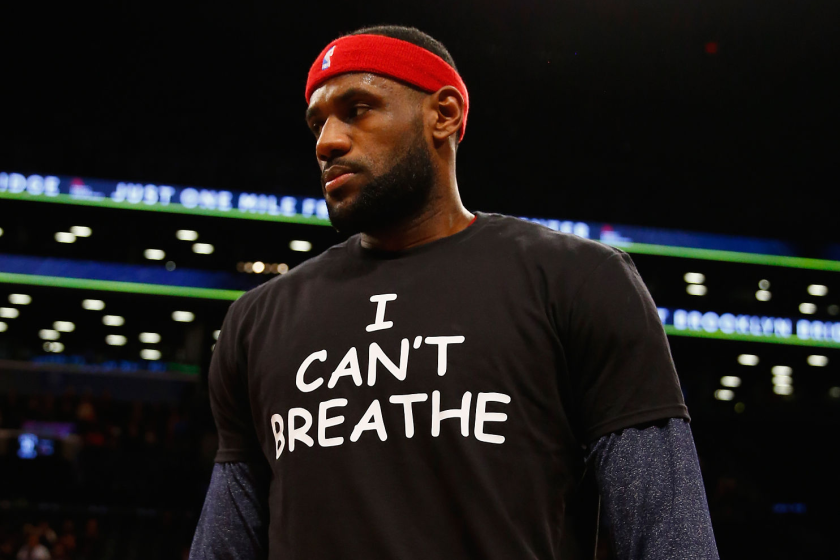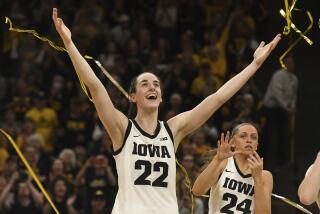Drew Brees, Dabo Swinney and the end days of the non-racist

- Share via
Saints quarterback Drew Brees is not a racist.
A year ago this time, that would’ve been widely viewed as a good thing. Not being a racist just a month ago might have earned you praise, an award even. Hell, Donald Sterling was a racist and he still got an award, from the Los Angeles chapter of the NAACP, no less.
But in the aftermath of George Floyd’s killing, the masses are beginning to recognize what identifying as “not racist” really is— complicity.
If non-racist were a beer, each sip would have all the flavor of white privilege with a lot of empty calories and a bitter, shameful aftertaste. This country isn’t trying to atone for the original sin of slavery because it’s being overrun by racists yelling slurs in the streets. No, we’re here in large part because of the surplus of non-racist white people. Those well-meaning individuals who personally would never discriminate against someone of a different race but would vote for someone who does for the right tax cut. The person who watched Floyd’s life slip away on video, then penned a vague statement about “diversity” and “inclusion,” maybe even threw in a quotation from Martin Luther King Jr. The person so committed to not being racist they can’t bring themselves to say the word “race” or “racism.” The person you ask about protesting police brutality who lectures you about looting.
Or the flag.
“I’m sorry it has taken this long to act and to participate in a meaningful way, but I am your ally in this fight,” Brees posted on Instagram on Thursday evening along with a video. This, after releasing a carefully worded statement earlier in the day in which he said, “I recognize that I am part of the solution and can be a leader for the black community in this movement.”
It’s a fine sentiment, but what’s needed is for Brees to be a leader for the white community in this movement. What’s needed is for him to uproot himself from the comforts of being “not racist” and become “anti-racist.” Here’s what I mean: If Brees throws an interception and none of his teammates tackle the defender, that defender will go in for six and hurt the Saints’ chances of winning.
Now if the Saints were simply non-interception, they would say, “Hey, I didn’t throw the pick, he did.” But that’s not what happens, is it? No, if Brees throws an interception the entire team becomes anti-interception because they recognize that not stopping that defender from scoring hurts the entire team.
Drew Brees apologizes for ‘insensitive’ comments reiterating opposition to Colin Kaepernick and others kneeling during the national anthem.
Drew Brees is not a racist, and that’s a good start. But that’s just the minimum requirement for entry. Assuming he is genuine when he says, “I am your ally in this fight,” then he and others need to roll up their sleeves and fight. Non-racists don’t fight. They observe. They may shake their finger disapprovingly, or tweet a crying emoji.
Or issue bland statements as Clemson coach Dabo Swinney — who allowed, without repercussions, a white assistant coach, Danny Pearman, to use the N-word during a 2017 practice — did in the wake of Floyd’s death. (“We have to all accept the challenge and bring about positive change and growth.”)
Or throw public support behind the NFL’s Rooney Rule, which was designed to fight racism in the NFL’s hiring process, while saying he didn’t see racism in the league, as Denver Broncos coach Vic Fangio did this week.
Non-racists might apologize, as Brees and Fangio did, but they don’t fight because it costs something. It expends effort. It removes the middle and forces you to choose a side, and that creates discomfort. There are a lot of unprecedented elements to the global response to George Floyd’s murder. But I would argue the most shocking element is this line that has been drawn in the sand.
The death of the non-racist.
“If you still haven’t figured out why the protesting is going on. Why we’re acting as we are is because we are simply F-N tired of this treatment right here! Can we break it down for you any simpler than this right here???? And to my people don’t worry I won’t stop until I see CHANGE,” LeBron James tweeted in response to Fox host Laura Ingraham, who said Brees is “allowed to have an opinion” two years after she admonished James to “shut up and dribble.”
This is where a lot of people are at this moment. Won’t stop until there is change. How committed Brees is to “being an ally” won’t be determined by how he supports blacks but, rather, how he challenges whites. His apology is truthful: “I will never know what it’s like to be a black man or raise black children in America.” But he does know that space in which complicity is the ally of the bottom line. He knows what it’s like to be part of a league that not only blackballed Colin Kaepernick but also hijacked the former 49ers quarterback’s message of social justice without acknowledging his involvement.
A line has been drawn. This week Brees has learned people will no longer tolerate the comfortable middle. He has learned being “non-racist” is no longer enough. We know what he said in his apology. We know how he has focused his resources on inarguably good causes, as he did in the wake of Hurricane Katrina. But in a post “non-racist” world … how will he live?
Doc Rivers encapsulates plight of black athletes: “When they’re wearing the uniform, they’re seen as an athlete. When they take it off, it’s a problem.”
More to Read
Go beyond the scoreboard
Get the latest on L.A.'s teams in the daily Sports Report newsletter.
You may occasionally receive promotional content from the Los Angeles Times.













